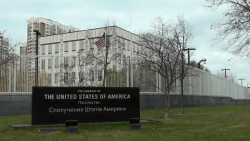A federal judge on Tuesday blocked President Joe Biden’s controversial asylum policy, delivering a major blow to the administration, which has leaned on the measure to drive down border crossings. The judge put the ruling on hold for 14 days for a possible appeal.
The ruling against the Biden administration could have major implications on the US-Mexico border, where crossings have plummeted since the rollout of the asylum policy, among other measures. A Justice Department spokesperson told CNN that the department plans to appeal.
“The Justice Department disagrees with the district court’s ruling today in the East Bay case and intends to appeal the decision and to seek a stay pending appeal. We remain confident in our position that the Circumvention of Lawful Pathways rule is a lawful exercise of the broad authority granted by the immigration laws,” the spokesperson said.
Judge Jon Tigar of the California Northern District Court previously ruled against a similar policy under the Trump administration and expressed skepticism that there was any daylight between Biden’s policy and the Trump-era one during a court hearing last week. Administration officials have rejected the comparison to Trump-era rules.
The Biden administration has rolled out a series of measures to try to stem the flow of migration and manage the situation along the US-Mexico border but is facing multiple lawsuits from Republican states as well as advocates, posing a risk to Biden’s border plans.
Tigar’s ruling stems from a lawsuit brought by the American Civil Liberties Union among other immigrant rights groups over a new asylum rule that largely bars migrants who passed through another country from seeking asylum in the United States, marking a departure from decades-long protocol.
The Biden policy, like the Trump-era one, garnered wide condemnation from Biden allies, including Democratic lawmakers and immigrant advocates when it was rolled out. “To be clear, this was not our first preference or even our second,” an administration official conceded at the time, adding that the onus is on Congress to pass reform.
The ACLU applauded the ruling in a statement.
“The ruling is a victory, but each day the Biden administration prolongs the fight over its illegal ban, many people fleeing persecution and seeking safe harbor for their families are instead left in grave danger,” said Katrina Eiland, deputy director of the ACLU’s Immigrants’ Rights Project, who argued the case. “The promise of America is to serve as a beacon of freedom and hope, and the administration can and should do better to fulfill this promise, rather than perpetuate cruel and ineffective policies that betray it.”
The union representing federal officers who interview asylum seekers also welcomed the decision. The union had submitted a brief in support of the plaintiffs in the case.
“The new rules fly in the face of well-established law and place refugees at risk of forcible return to countries where their lives or freedom may be threatened. The crisis at our Southern Border is really a crisis of our national conscience,” Michael Knowles, spokesperson for the AFGE National Citizenship and Immigration Services Council 119, said in a statement.
The Justice Department appealed the ruling Tuesday. The case will go to the Ninth Circuit, which twice affirmed Tigar’s rulings on similar policies under Trump.
During last week’s hearing, Justice Department lawyer Erez Reuveni argued that the rule has exemptions and that there are other lawful pathways that have been made available to migrants seeking to come to the United States.
Migrants who secure an appointment through the CBP One app to present at port of entry, for example, are exempt. While there are some exceptions, the rule generally applies to migrants who unlawfully cross the US-Mexico border. It doesn’t apply to unaccompanied migrant children.
Blocking the rule, Reuveni told Tigar, would “potentially undermine the ability to negotiate” with countries who have partnered with the US to manage the flow of migration.
Eiland, who argued on behalf of the plaintiffs, said the rule put migrants in harm’s way and that the regulation itself doesn’t provide any additional pathways. “There are no carrots that the rule itself actually offers,” she said.
Administration officials have pointed to a dramatic drop in border crossings since the end of a pandemic policy, known as Title 42, that allowed for the quick expulsion of migrants, as evidence that the administration’s approach, including increased deportations and tougher penalties.
In June, US Border Patrol arrested nearly 100,000 migrants along the US southern border, marking a decrease from May and marking the lowest monthly border encounters since February 2021, according to US Customs and Border Protection data.
But the Biden administration has continued to grapple with unprecedented mass movement of people in the Western hemisphere, which is the outcome of the coronavirus pandemic decimating conditions in the region.
The shifting migration patterns has put a strain on federal resources, as border authorities have encountered an increasing number of Cubans, Venezuelans and Nicaraguans. The US is largely barred from deporting migrants from those nationalities back to their home countries because of strained diplomatic relations.
Tigar concluded that the programs that provide migrants an avenue to apply to lawfully migrate to the US are specific to certain nationalities and not meaningful options for all asylum seekers.
“The Rule therefore assumes that these exceptions will, at the very least, present meaningful options to noncitizens subject to the Rule. Parole programs are not meaningfully available to many noncitizens subject to the Rule. Though other parole programs exist, the Rule generally relies on the parole programs for Cuban, Haitian, Nicaraguan, Venezuelan, and Ukrainian nationals. These programs are country-specific and ‘are not universally available, even to the covered populations,’” he wrote.
He also said that the government violated a law known as the Administrative Procedures Act – which sets certain guidelines for how agencies can roll out policies – in its implementation of the asylum rule.
“To justify limiting eligibility for asylum based on the expansion of other means of entry or protection is to consider factors Congress did not intend to affect such eligibility,” Tigar wrote. “The Rule is therefore arbitrary and capricious.”
This story has been updated with additional developments.


















